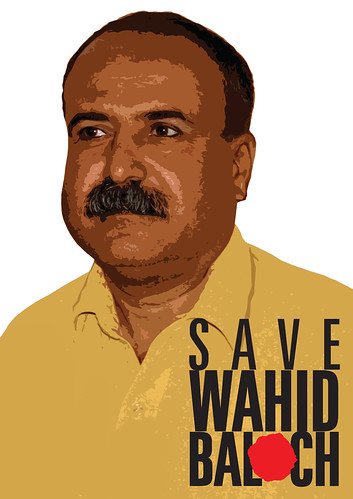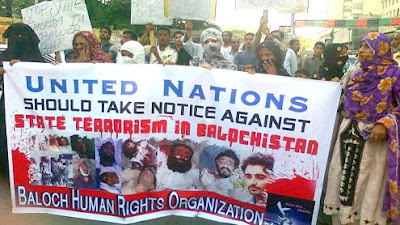Press
Release: Highlights of the BHRC’s campaign at the Broken Chair in Geneva
In view of the human rights challenges facing the
people of Balochistan at the hands of the security establishment of Pakistan,
and considering the vulnerable situation facing the Baloch as a national
entity, the Baloch Human Rights Council – UK organized a major three
days awareness campaign during
the 40th session of the UNHRC directed at highlighting the plight of the
Baloch people demanding international intervention into the 'unchecked and
concentrated brutalities' being perpetrated against them by the state security
forces of Pakistan for the last many decades.
The three days campaign commenced on 10th
March 2019 by setting up of a Tent at the Broken Chair in Geneva with a noticeable sized note
reading, “Save The Baloch” and “#Baloch Genocide” erected on roadside. The
campaign concluded on 13th
March 2019, comprising of various activities as listed below:
1. Exhibition on Human Rights
situation of Balochistan:
A series of documentaries portraying a detailed
account of various human rights violations and their repercussions being
perpetrated by the state authorities of Pakistan against the Baloch people were
played at intervals on 10th and 11th March 2019. The
documentaries explained in a chronological order the historical context of the
human rights situation in Balochistan making it into the present.
2. Human Rights Conference:
On the second day of the awareness campaign, the
BHRC convened a major conference entitled, “Balochistan of Pakistan: the Human Cost” at the Broken Chair
in Geneva to bring forward a more informed opinion regarding the generally
underestimated and largely overlooked human rights situation of Balochistan.
The conference moderated by Qambar Malikhad invited a distinguished
panel of speakers from diverse backgrounds and with extensive experience in the
area who shared their insights on the subject matter. The conference was
presided by the General Secretary of the BHRC Samad Baloch while the
prominent among the speakers were Paulo Casaca of South Asia Democratic
Forum, Member of the European Parliament Ryszard Czarnecki, Executive Director of IHRC Baseer Naweed, Human Rights Defender Dr. Zafar Baloch, HRCB’s Chairperson Taj Baloch, Lucia Parrucci of UNPO, Dr.
Hidayat Bhutto of WSC and Human Rights Defender Karima Baloch.
At the
end of the conference proceedings a Resolution was
adopted affirming and asserting the following:
Conference Declaration:
1.
Expresses
extreme concern on the continuing state supervised human rights violations in
Balochistan and noted that the kill and dump policy adopted by the state
security agencies in Balochistan for the last two decades, has costs hundreds
of precious lives.
2.
Draws
the attention of international community towards the extra-judicial killings
and enforced disappearances of the Baloch political and social activists by the
army and its proxy death squads. Expresses deep concern at the silent
complicity of the international community at the grave violations of human
rights in Balochistan and demands that international human rights organizations
should step up their efforts against the brutalities of the Pakistani military
establishment in Balochistan.
3.
Urges
the Secretary General of UNO to exert pressure on Pakistani authorities to end
the brutal treatment and enforced disappearances of the Baloch social,
political and literary figures and to abandon its
inhuman “kill and dump” policy in
Balochistan.
4.
Emphasizes
further that the Baloch people are facing a situation where not only the
personal security is at stakes but also their socio-cultural values, languages,
traditional knowledge system, and way of life are suppressed violently in order
to dilute their demand for the right of self-determination.
5.
Expresses
concern over the fact that being one of the richest land in the world, the
people are Balochistan are among the poorest of the poor. This is because of
the systematic disenfranchisement of Baloch and ruthless exploitation of their
resources by Pakistani state in the benefit of Punjab under the pretext of
various controversial mega-projects including the most recent and much hyped
China-Pakistan Economic Corridor (CPEC).
6.
The
Baloch as a nation has the inherent and universal right of self-determination
as enshrined in international law, including in the Charter of the United
Nations, the International Covenants on Civil and Political Rights and on
Economic, Social and Cultural Rights. The implementation of the right of
self-determination is fundamental for the survival of the Baloch, including
their cultural values, languages, religions, economy, and ways of life, land
and resources.
7. The international community must
come forward and urge the government of Pakistan to refrain from the use of
oppressive measures leading to human rights violations against the Baloch. It
must take immediate measures to ensure that the perpetrators of human rights
violations within the Military, paramilitary and proxy organizations of these
States to face justice.
3. Protest Demonstration:
Following the conference on 11 March 2019, BHRC held
a protest demonstration at the Broken Chair lashing out at the discriminative
and anti Baloch policies of the Pakistani authorities. The protest was joined
in by the representatives from World Sindhi Congress, and people representing
Pashtuns and Kashmiris who accused the Pakistan state authorities of dehumanizing
the Baloch and demanded an intervention of the International community into the
matter to refrain Pakistan from further suppression of ethnic minorities in
Pakistan. The participants also demanded fair trial and safe release of forced
disappeared Baloch socio-political activists and human rights defenders in
Pakistan.
4. Intervention on Item 3 and Item
4:
Taj Baloch of Human Rights Council of Balochistan
(HRCB) delivered a speech on Item 3 on the Human rights situation in
Balochistan at the 40th session of the UNHRC on 10th
March 2019 whereas Karima Baloch a prominent Human rights defender read her observations
on Item 4 at the UNHRC 40th session to draw the council’s attention
on the Human rights crisis in Balochistan on 13th March 2019.
5. Memorandum to UN General
Secretary:
A memorandum intended to draw the attention of the concerned
offices to the humanitarian crisis
developed in Balochistan because of the actions of Pakistani security forces, Samad Baloch the General Secretary of BHRC
submitted memorandums to the offices of UN General Secretary and the UN High
Commissioner for Human Rights on 12th March 2019.
For more pictures of the event Click:
https://www.facebook.com/153593348036053/photos/ms.c.eJxF0VGSRTEEBNAdTSG0tv~_NTUUe9~;eUFsGOVB6XU0LC6s8awj0yQiMGwm~_FJwcQXXF8gGpumtwI2fBFqjoi8gMouqliwKwjPk3x5pCdAyENXgvREdUBvMjZCOpWoHIgezBwBgO1I~;rBq9jRUfpgm1Z2ROwHKS8SE0l94AunP4fd2N1qhhcW3O4~_rGShuiIW8OaQWHg9vqbZh7JvDuoDXeh9RM4~_KNKAOQPVG2I~_R~_N9hXl7qMo9gBmLsAEmK~_65BgoBOyrnB1DcSPZfGmC3Qk4OsJuC0zQ1A2ZF~_wdNyInA.bps.a.2309729702422396/2311056842289682/?type=3&theater












